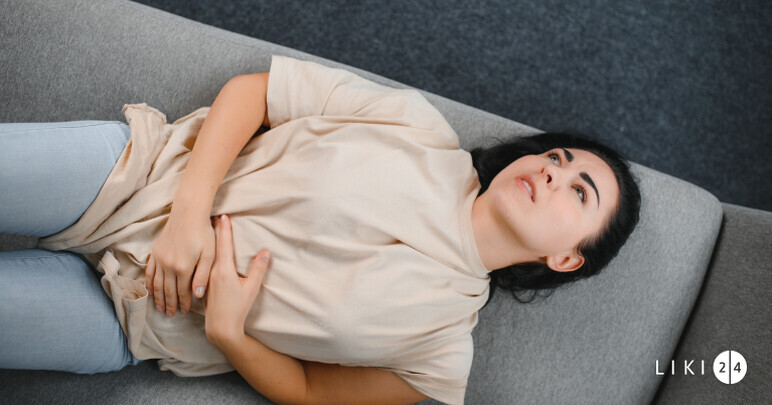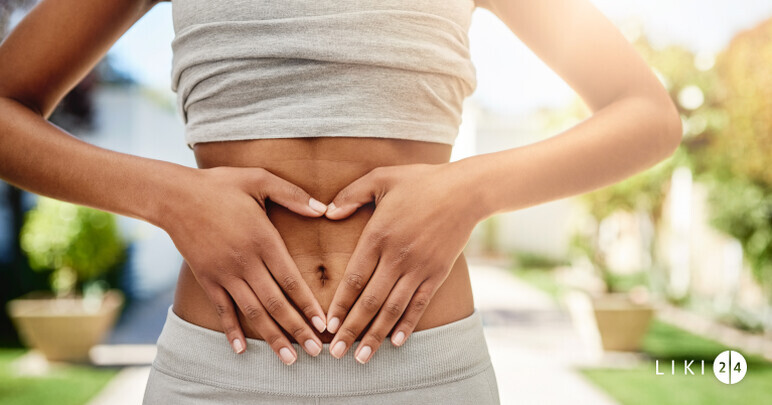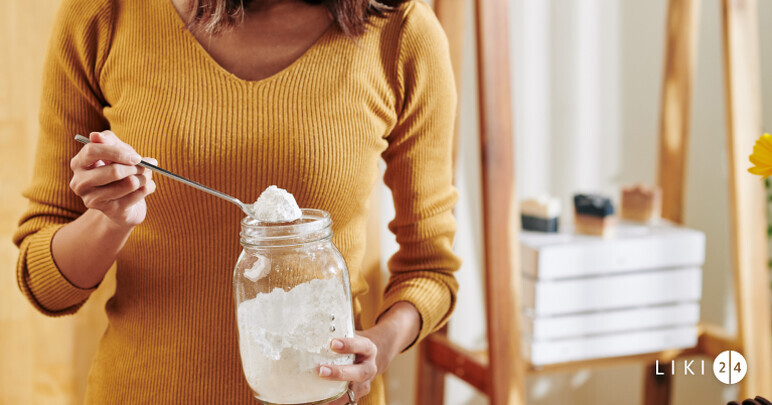¿Cómo se produce la gastritis?
El estómago tiene un revestimiento mucoso protector: el moco. Este revestimiento protege al estómago del ácido gástrico que digiere los alimentos. Cuando ciertos factores dañan o debilitan este revestimiento protector, la mucosa se inflama y se produce la gastritis. La bacteria llamada Helicobacter pylori es la causa más común de gastritis.
La gastritis erosiva es una forma menos frecuente. No suele causar inflamación grave, pero puede provocar hemorragias y úlceras en el revestimiento del estómago. Si no se trata, la gastritis puede provocar anemia debido a las hemorragias, así como deficiencias de vitaminas y minerales o úlceras. Debido a estas posibles complicaciones, es esencial consultar a un médico si experimenta síntomas de gastritis, con el fin de recibir el tratamiento adecuado.
Síntomas de la gastritis
La gastritis no siempre provoca síntomas perceptibles. Muchas personas con gastritis no presentan ningún síntoma. Sin embargo, el dolor suele aparecer en algún momento. El síntoma más común de la gastritis es el dolor en la parte superior del abdomen, justo debajo del esternón. Otros síntomas de gastritis son:
- Vómitos y náuseas;
- Llenura en la parte superior del abdomen, especialmente después de las comidas;
- Indigestión;
- Acortamiento o pérdida de apetito;
En caso de gastritis erosiva, puede experimentar diversos síntomas, entre ellos:
- Heces negras de aspecto alquitranado;
- Vómitos sanguinolentos o con aspecto de posos de café.
Causas de la gastritis
Las causas de la gastritis pueden ser:
- Infección por Helicobacter pylori - la gastritis crónica suele ser consecuencia de una infección por Helicobacter pylori en el 90% de los casos;
- Aumento de la administración de medicamentos antiinflamatorios no esteroideos - los antiinflamatorios no esteroideos pueden aumentar la concentración de jugos gástricos ácidos producidos en el estómago, y el aumento de la acidez puede inflamar y dañar el revestimiento estomacal;
- Aumento del consumo de alcohol - el aumento del consumo de alcohol a largo plazo especialmente puede afectar al revestimiento del estómago, haciéndolo más sensible y propenso a sufrir daños;
- Afecciones autoinmunes - por ejemplo, en quienes padecen gastritis atrófica autoinmune, el sistema inmunitario ataca el revestimiento del estómago;
- Daños estomacales: los traumatismos físicos o los daños en el revestimiento del estómago también pueden provocar gastritis.
Los factores alimentarios no suelen causar gastritis, pero las alergias alimentarias y la celiaquía pueden contribuir a ella.
Algunos factores de riesgo de gastritis son:
- Fumar;
- Aumento del nivel de estrés;
- Historia de vómitos crónicos;
- Deficiencia de vitamina B12.
Tratamiento de la gastritis
El tratamiento de la gastritis varía en función de la causa. Algunos medicamentos destruyen las bacterias, mientras que otros alivian síntomas como la indigestión. Si padece gastritis causada por antiinflamatorios no esteroideos u otros medicamentos, se recomienda evitar estos fármacos para aliviar los síntomas.
Aquí tienes los principales medicamentos para la gastritis:
- Antibióticos - para tratar la infección bacteriana responsable;
- Antiácidos: pueden neutralizar la acidez estomacal;
- Inhibidores de la bomba de protones - como omeprazol, pantoprazol, esomeprazol o lansoprazol - que reducen la cantidad de ácido producido por el estómago;
- Bloqueantes H2 - como la ranitidina - que disminuyen la producción de ácido estomacal.
Antiácidos para la gastritis
Los antiácidos suelen utilizarse como primer tratamiento para la gastritis para reducir la cantidad de ácido en el estómago. De esta forma, pueden favorecer la curación. Un ejemplo de antiácido para la gastritis incluye Gaviscon, un eficaz supresor del reflujo, que forma una capa protectora sobre el contenido del estómago, reduciendo los síntomas. Asimismo, Dicarbocalm antiácido alivia rápida y eficazmente los síntomas causados por el exceso de ácido estomacal, al estar basado en carbonato cálcico, carbonato magnésico y trisilicato magnésico.
Otros medicamentos recomendados para la gastritis
Si el tratamiento con antiácidos no es suficiente, puede recomendarse un fármaco llamado bloqueante H2. Un medicamento alternativo que puede utilizarse es el inhibidor de la bomba de protones (IBP). Los probióticos también pueden recomendarse para restablecer la flora. Estos pueden mejorar la digestión y favorecer el tránsito.
También puede ser útil tomar diferentes tipos de suplementos protectores, que protegen el estómago de irritantes, manteniendo la mucosa gástrica funcional y sana. Por ejemplo, Estómago Sano de Fares contiene extractos naturales de caléndula, patlagina, girasol, regaliz, etc., con efecto antiinflamatorio, cicatrizante y protector. Un producto similar con acción protectora es Helicostop de Fares, que inhibe el desarrollo de H. pylori en la mucosa gástrica, prácticamente un efecto antibacteriano natural.
Además, también se puede consumir té para la gastritis. Estos tés pueden aliviar algunos síntomas digestivos y tienen un efecto protector sobre la mucosa gástrica. Pueden incluir hierbas como caléndula, cola de caballo, regaliz, anís, girasol, etc. - infusiones digestivas.
Dieta para la gastritis
- Evite los alimentos picantes y especiados, irritantes, ácidos, fritos o grasos.
- Coma menos cantidad y con más frecuencia en lugar de comidas copiosas.
- Lim ite y evite el consumo de alcohol.
- Deje de fumar. Dejar de fumar puede reducir la irritación del revestimiento del estómago, favoreciendo la cicatrización.
- Para la gastritis se suele recomendar una dieta antiinflamatoria. La gastritis se refiere a la inflamación del revestimiento del estómago, por lo que una dieta que ayude a minimizar la inflamación puede proporcionar alivio con el paso del tiempo.
En general, la comida no causa gastritis crónica, pero el consumo de ciertos alimentos puede agravar los síntomas: alimentos fritos, picantes, muy ácidos. Por otro lado, los alimentos que pueden ayudar a aliviar los síntomas de la gastritis (alimentos para la gastritis) incluyen alimentos ricos en fibra, como cereales integrales, frutas, verduras, legumbres, alimentos bajos en grasa y en ácido.
¿Cómo se puede prevenir la gastritis?
Hay algunas medidas que podemos tomar para reducir el riesgo de gastritis, a saber:
- Preste atención a las medidas de higiene para reducir el riesgo de infección por Helicobacter pylori.
- Evite los desencadenantes conocidos, según proceda. Evite los alimentos fritos, grasos o muy ácidos.
- Deje de fumar y limite el consumo de alcohol.
- Gestione el estrés de forma eficaz.
- Evite el uso excesivo de antiinflamatorios no esteroideos.
El Helicobacter pylori es una de las principales causas de gastritis, pero la mayoría de las personas no saben que están infectadas. La bacteria se transmite fácilmente. Se puede reducir el riesgo de infección practicando una buena higiene, especialmente lavándose las manos.



 Bienestar
Bienestar  Fitness
Fitness  Nutrición
Nutrición  Belleza
Belleza  Bienestar
Bienestar  264 vistas
264 vistas 



 Artículo anterior
Artículo anterior 







